You can see this water tower when you are approaching Pawnee Buttes, about
60 miles NE of Fort Collins. It is a landmark of Keota, one of the prairie ghost
towns.
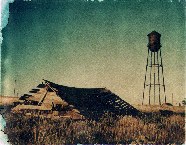
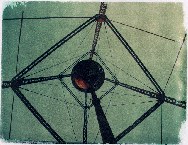
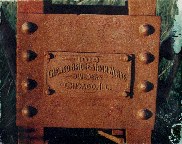
One of the Indian meanings of Keota is "the fire has gone out" which was quite
prophetic for this town. Keota was platted by the Lincoln Town Co. in 1888 shortly
after the Colorado & Wyoming Railroad built a branch from Sterling to Cheyenne.
The town obviously had a difficult start. The Post Office was open in 1888 and closed
just two years later, and then reopened in 1909. The town grew around a hotel and businesses.
The 1911 billing in the Keota News was quite encouraging:
"At an elevation of almost 5,000 feet where the air is pure and health giving,
where we have no cyclones or hot winds, where we have beautiful Rocky Mountains
only 80 miles away as a background and where water is the purest and in abundance.
Doesn't it appeal to you Mr. Man looking for a home as a good place to drop
anchor?"
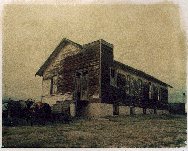

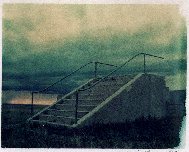
Even during its most successful time,
just before the World War I, Keota never had a population of more than 150, but it
served some 1000 to 1500 homesteading neighbors. At that time Keota had daily
passenger service on the railroad, then service became weekly, then not at all.
The water from wells became undependable and during the driest years water had to
be shipped in by railroads and trucks. The bank failed in 1923. The high
school built in 1915 was closed in 1951.
Railroad tracks were dismantled 1970s and, finally, the post office was discontinued in 1974.
Today, the remaining ruins including the church
are being repossesed by the prairie. However, there are still a few residents living
there.
Purcell
Old gas station in Purcell, Weld County, about 5 miles east and 15 miles north
of Greeley.
Purcell was established in 1910 when the Union Pacific Railroad built a spurline
to transport the lush grains and cattle in this region. Like many Colorado communities
it was strangled by the drought of Dust Bowl
in the 1930s and, finally, died from
lack of water. Purcell citizens were fighting for an elaborate irrigation plan to
divert water from Laramie, Wyoming, into the Cache la Poudre, to put about one million
acres of northern Colorado under irrigation. Wyoming desparately fought the idea, and
it never got implemented. The railroad was removed in 1943, post office was closed in 1951.